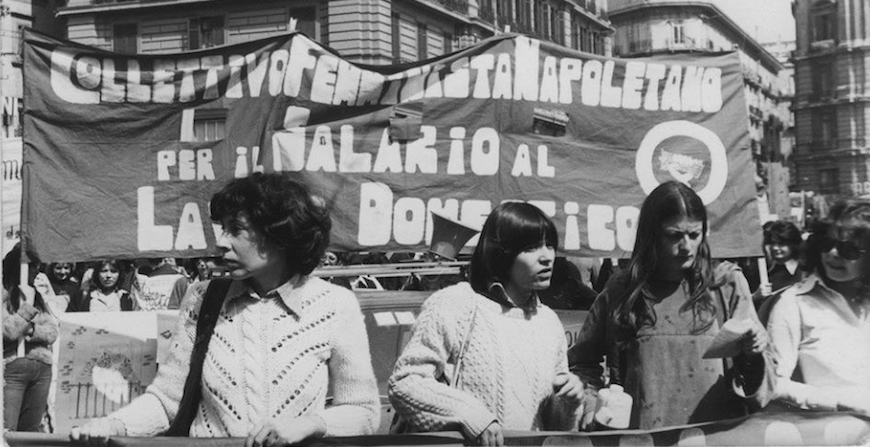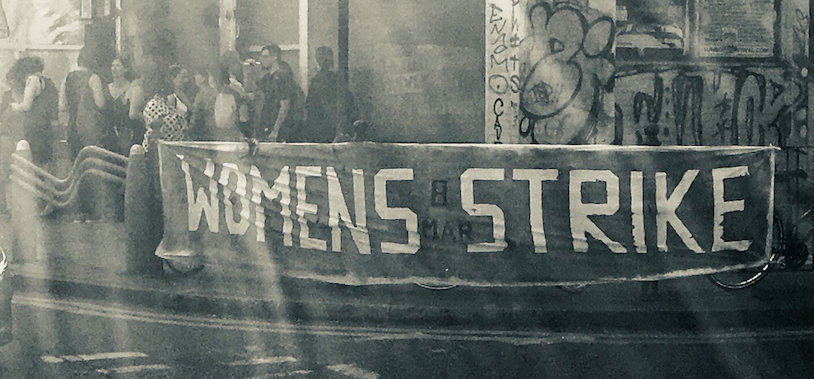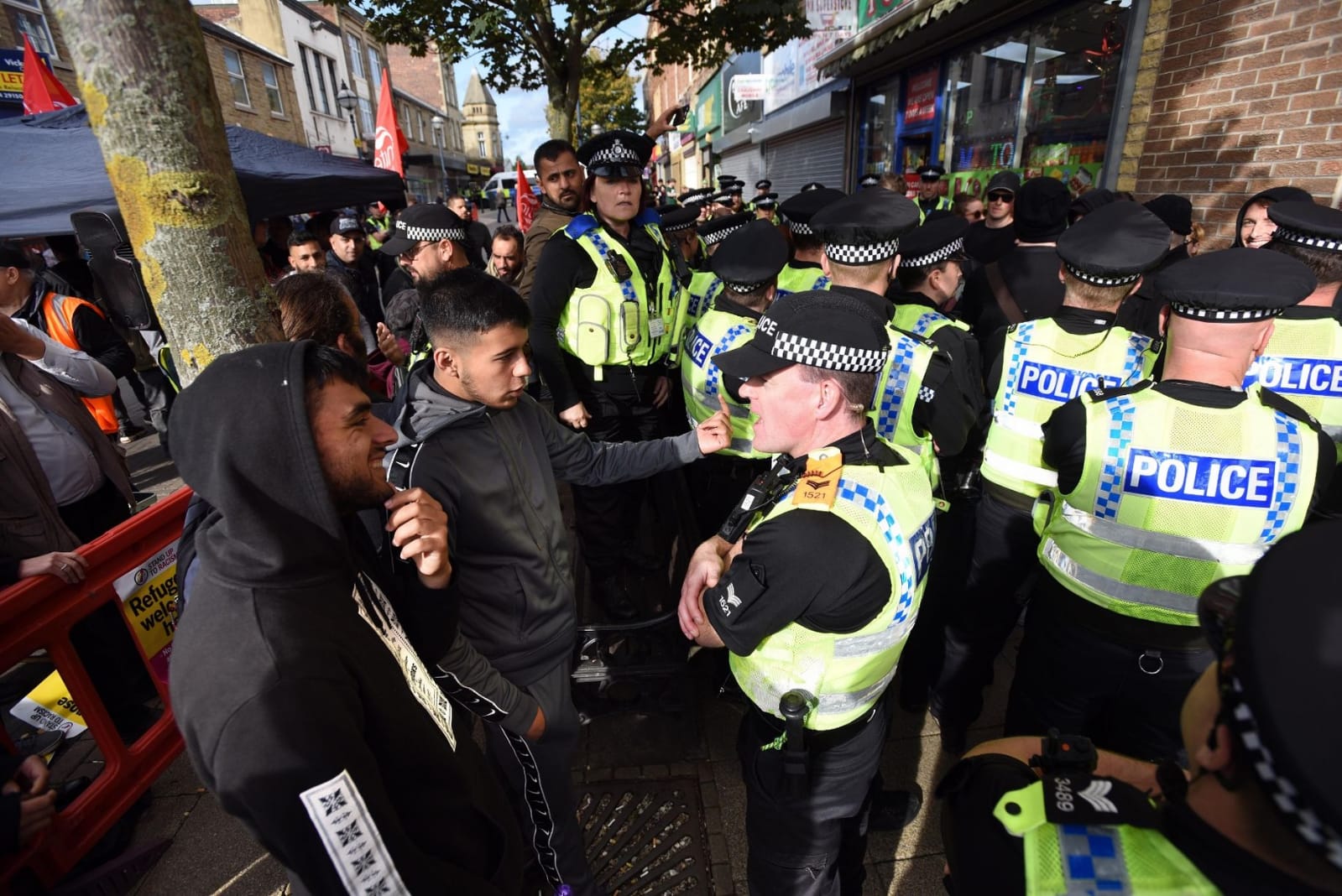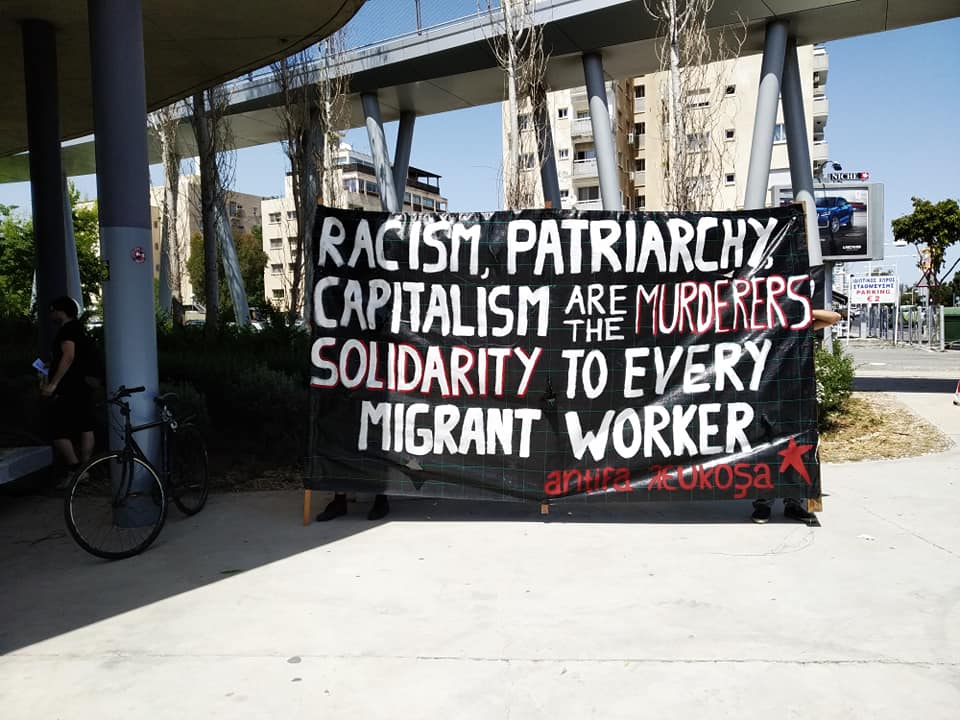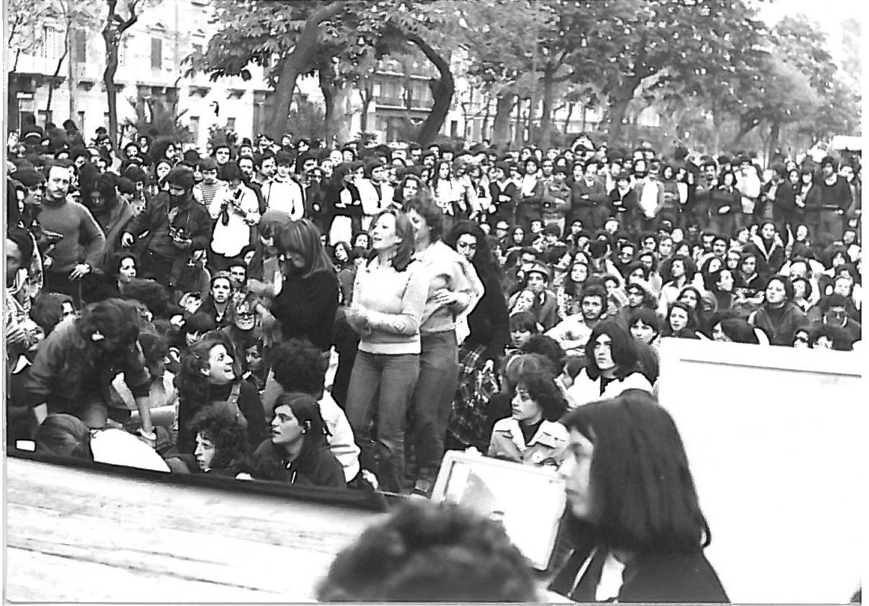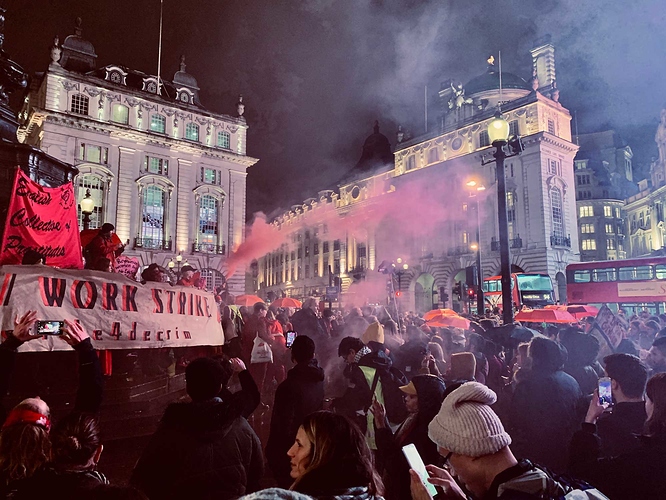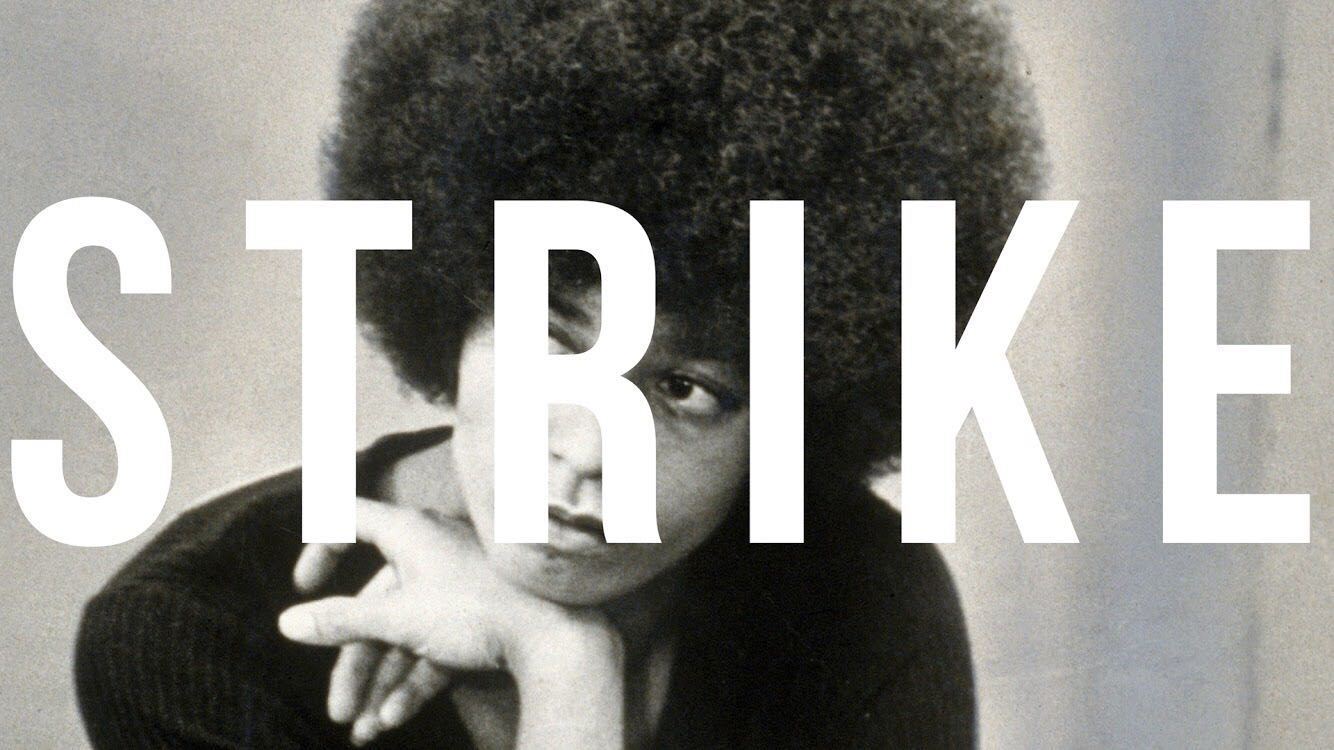The Women’s Strike in Britain began with women coming together to explore our visions of the red feminist horizon – what it could look like and how, crucially – how we could get there. The argument that we want to make is that the Women’s Strike is not a one-day event set to coincide with International Women’s Day each year – it’s not an activist campaign or a “women’s” project. In Europe and across the world we are witnessing the emergence of an international movement that is experimenting with and struggling for a feminist future. In the last few years we have fought back and we have won – let’s just take a moment to acknowledge that last year we have won abortion rights in Ireland – and the North is next. We have fought tooth and nail across the Americas, from US Supreme court nominations of sexual abusers, to abortion rights in Argentina and against fascists candidates and movements in Brazil and recently to a limited degree in the US midterm elections. We are not the first generation, nor will we be the last, to know that women’s liberation must be central to all social movements. We are not asking for our fair share under capitalism, we have zero desire for an equality that promises nothing more than being equal to a wage slave: instead we are seeking to destroy altogether the system that by its very design – divides, harms and exploits us. We already know women’s liberation to be at the heart of the struggle. But just so we are clear: there will be no revolution until women’s lives and our labour are central to every political question.

In moving towards a red feminist horizon we continue the work of our feminist mothers and grandmothers in destabilizing ideas of womanhood. We refuse to be divided into good and bad women. We are not interested in reproducing a version of feminism that only makes some women visible, namely those who are white, middle class, cisgender and heterosexual. Nor is there anything stable, inherent or natural about being a woman. As Chandra Mohanty so forcefully argued 35 years ago, the relationship between “Woman” – a cultural and ideological construction and “women” who are real material subjects of our collective histories is one of the central questions that feminism seeks to act upon.
Each time we strike, each time we assemble, each time we take to the streets – we confront the reactionary and patriarchal ideas of what it means to be a woman today. Like that we are still all considered ‘naturally’ caring, that we all want to be mothers – especially good mothers, that most of the time we are asking for it and the rest of the time we are in need of protection. Our struggles demand the revaluation of care work and emotional labour – sounds complicated but really just boils down to more people who are not working class women getting involved in the immense amount of work that keeps everyone alive. Every. Single. Day. What it doesn’t mean is hiring a cleaner so your wife or girlfriend finally stops complaining. We urgently need to respect and work alongside young people in creating a future in which they are listened to as people and one that wouldn’t dream of putting kids in solitary confinement at privatised state high schools, or concentration camps in the desert. We need urgent support for people who care for children and we desperately need a plan to care for and offer dignified lives to the older members of our communities. If the last few years have taught us anything it is that as a matter of local, national and international urgency we must combat the structural and systemic forms of violence and exploitation that harm so many women.
Let us also be clear that reducing what it means to be a woman to set of biological characteristics and reproductive capacities and claiming that women’s oppression and exploitation is the direct result of having a certain genital configuration is a specific form of reactionary and misogynist politics that we have no interest in. From decades of black feminist theory we have learnt that universalist claims of what it means to be a woman serve the interests of some women at the expense of others. Such claims actively work against the possibility of meaningful connections and solidarity being forged between members of the working class who experience womanhood in different ways.
As such we are no longer interested in the faux-debates of whether sex work is ‘real’ work, if the Women’s Strike is a ‘real’ strike, whether the millions of hours we spend caring and cleaning produces ‘real’ value, or if trans women are ‘real’ women. Attempts to undermine the strength of this movement and thump the table about ‘authenticity’ say far more about those that seek to reduce women to our biological functions and confine us into victimhood, than it does about the vibrant and militant tidal wave we are building. By looking to the wealth of knowledge produced by black feminism, transfeminism and sex worker rights movements we know who our sisters are. We know that women of colour, trans women and sex workers have a central role to the play in dismantling the capitalist patriarchal systems of power that oppress us all.
 Sex/Work Strike 2018
Sex/Work Strike 2018
We began the Women’s Strike as we intend to proceed. On the morning of the 8th March 2018 in London we organised a defiant direct action at the Department of Health to demand urgent action on trans healthcare. In the afternoon, over a 1000 people assembled for over four hours in central London, arriving from university picket lines in their hundreds and walking out of their offices, homes and factories. A social reproduction collective of mainly men organised collective childcare and cooked food to feed the whole assembly. We stood in solidarity with our Kurdish sisters, making it clear that we will defend the revolution in Rojava because their liberation is bound up with ours. Later on, we picketed pro-life religious organisations and joined striking cleaners who occupied Topshop to highlight their disgusting treatment of workers.
In the evening we took over the streets of Soho and marched with sex workers who were on strike for the decriminalisation of all forms of sex work. We heard from migrant sex workers who were arrested and humiliated during so-called ‘anti-trafficking’ raids that did nothing for women in the sex industry and everything for property developers. We listened to strippers who are denied basic employment rights. Our evening ended with hundreds of comrades, including sex workers and trans activists, joining the Picturehouse workers who have been striking and protesting for over a year to demand the living wage and decent working conditions. On March 8th 2018 we exceeded the narrow categories of womanhood forced upon us and make good on our promise to make feminism a threat again.
 Gail Lewis speaking at the Women’s Strike 2018
Gail Lewis speaking at the Women’s Strike 2018
Returning to the idea that the Women’s Strike is not an event but instead a process we want to briefly outline the Women’s Strike Assembly’s current industrial and political strategy for the sex industry and the establishment of Decrim Now: the national campaign for sex workers’ rights that is demanding and – will win – the decriminalisation of sex work and what it means for sex workers to be leading the discussion about sex, violence and workers rights. In the #metoo era it is crucial that we talk from both forms of reproductive work – waged and unwaged. Specifically we have to be attentive to the discomfort of thinking about sex as work even when we don’t get paid.
Beginning in June 2018, the Women’s Strike Assembly helped to initiate a unionisation drive of workers across Britain sex industry with the grassroots union, United Voices of the World. Because of how current laws and policies criminalise many aspects of sex work, the unionisation campaign is currently focused on organising strippers and dancers in clubs and pubs. Unionisation is the only way that we will be able to get bosses and clients to treat sex workers with the dignity and respect that we all deserve.
We want to unionise the sex industry because we want to build collective power. We are not interested in passing judgement on what type of work people do. We recognise that many women, men and trans people have a diverse range of experiences in the sex industry – good, bad and ugly. The current laws that regulate what workers can and can’t do with our bodies and the continued efforts to criminalise our workplaces make it difficult, at times nearly impossible, for workers to organise and unionise. One of the main reasons is that we are not considered to be workers (remind you of anything – say like housewives?). At best we are classified as self-employed (and as such have very few labour rights) but most of the time we are treated as victims in need of saving and rescue. For the last decade, national governments and local authorities have used concerns about trafficking in the sex industry as a cover to create a hostile environment for migrants in the sex industry. Raids on premises, closure of clubs, arrests and deportations have done next to nothing to address instances of forced and coerced labour in the sex industry. Instead, bosses now have even more power and migrant workers have been forced further underground and into more dangerous and precarious sex work. But. Because of the current criminalisation of the sex industry, unionisation will only get us so far.
We need to demand the full decriminalisation of sex work and changes to the policies regarding sex entertainment venues. We need a union at work and we need to change national legislation that affects our work. The reason we need to do both at the same time is to ensure that decriminalisation is in the interest of workers and not just bosses. Decriminalisation without unionisation means that workers will bear the full force of the market and the changes will be in the interest of bosses.
For too long, a reactionary and conservative vision of women’s rights has dominated feminism, especially in relation to the question of sex work and sex workers’ rights. Many feminists have been more than happy to allow the police and immigration officials to do their dirty work in trying to “abolish” the sex industry. While at the same time, corporate and so-called ‘radical’ feminists have had very little to say about the changes to social security benefits, introduction of zero-hour contracts and the housing crisis – all of which have ensured a steady stream of people looking for work in the sex industry. When we talk about the red feminist horizon we are sketching out the kind of feminist future that we want and crucially, how we get there. The red feminist horizon demands that we have full and final say on the meaning of our lives, how we labour and what is done to and with our bodies.
The strategy that we have outlined – which involves the unionisation of feminised workforces, plus public and national campaigns aimed at the nation state and policy, alongside feminist education and consciousness raising is not only relevant for the sex industry. Think of the question of childcare – currently the childcare workforce is mostly un-unionised, and around 97% women workers. The costs of childcare in Britain is some of the highest in Europe and the question of who does what reproductive work in the home remains central to the gendered division of labour.
In thinking with the red feminist horizon – the task is to conceptualise how a international women’s movement can organise antagonistic and militant struggles within the terrain of reproduction.
We want to just end with a few final comments about what is at stake – politically – in transforming politics by placing the conflicts and questions of reproduction at the centre of struggle. By which we mean the conflicts and struggles over what it means to produce and reproduce not only labour power (and the wage relation) but life itself. Without a doubt we have witnessed a ‘turn’ to the question of social reproduction across significant swathes of the radical left. However, despite this much needed shift in analysis – it is sobering that actually not that much has changed – or perhaps more correctly not nearly enough has changed. Granted we have a few more meetings with childcare and if you’re lucky there might be a plate of food at an evening meeting.
The point here is that a lot is at stake when the feminist intervention is packaged up, separated from “real” politics and politely understood as “care”. We need to be very clear that these are not “women’s concerns” – of course they are the concerns of many women but the social reproductive base that enables all of politics to even take occur is non-negotiable – it is our ground zero. Some of us remember that while sitting talking with Silvia Federici years ago – there was real real anger in her voice as she recalled her frustration that “we wanted so much more than fucking creches”.
A similar wave of frustration occurred at the end of 2018 as we watched months of organising work by hundreds of women and non-binary people across the country – brave, courageous work of building a feminist anti-fascist mobilisation, taking risks, pushing on the boundaries of what could and couldn’t happen – building a demonstration that explicitly and publicly set out to confront and disrupt the far-right – both politically by offering a feminist analysis of sexual and racial violence and materially by blocking them in the streets. We watched our organising efforts and moderate success on the day disappear – literally vanish in both the mainstream media accounts and also in the reports by organisations like Stand Up to Racism and the SWP. The irony can be lost on no-one that a feminist politics that demands a revaluation of that which is structurally made invisible and devalued – was literally made invisible – it’s like a feminist joke that just keeps on giving. Much like the joke of some men in the left expressing concern about our safety in leading anti-fascist demonstrations. As if we were “safe” the rest of the our lives or that questions of where and with whom we are safe had had only just now caught our attention.
In recent years we have been witnessing militant action and the politics of reproduction meeting each other – in our strikes, in our action and and in our assemblies. During the summer of 2018, the Women’s Strike Assembly began calling assemblies on the issue of violence – asking ourselves two questions – 1) what violence means and looks like in our everyday lives and struggles. And 2) what an anti-racist and anti-fascist feminist would need to look like. And so many women came and shared their experiences of rape, of sexual harassment, of racism, of transphobia, and equally our frustrations at both anti-fascist organising that has failed to adequately confront the question of misogyny and sexual violence and at feminist movements that have been unable to connect the tidal wave of #metoo anger to the experiences of working class women and girls in town after town after town. Women and girls who have been ignored, neglected and dismissed because they didn’t fit neatly into respectable victim narratives.
One of the striking insights to take away from these first few tentative months of feminist anti-fascist organising is that we have been able to link together so many different women’s struggles – from Kurdistan, to Brazil, to the deindustrialised north to our trans sisters right for dignity and liberation. A week after we blocked the fascists in Oct 2018, 8,000 women went on strike in Glasgow and you know what – it feels like the same fight. Because it is. This is precisely what the red feminist horizon demands. That our fight against fascism, much like our fight against the endemic nature of sexual violence or our struggle to halt the currently unfolding ecological collapse must put women – our lives and our labor – at the centre of understanding crisis and also at the centre of what it means to win.
There is much to be done. One would have to be a robot to not feel the vulnerability and urgency of our current political moment. But the feminist forces of rebellion and counter-power are growing and we are doing the work of building the links between different struggles and it should come as no fucking surprise that in country after country – it is the feminist movement that is leading the struggle, because
“Now you have touched the women: you have struck a rock; you have dislodged a boulder; you will be crushed – we will strike and we will win.”
From: Women’s Strike: WTF is the Women’s Strike?
Read more about the Women’s Strike HERE

